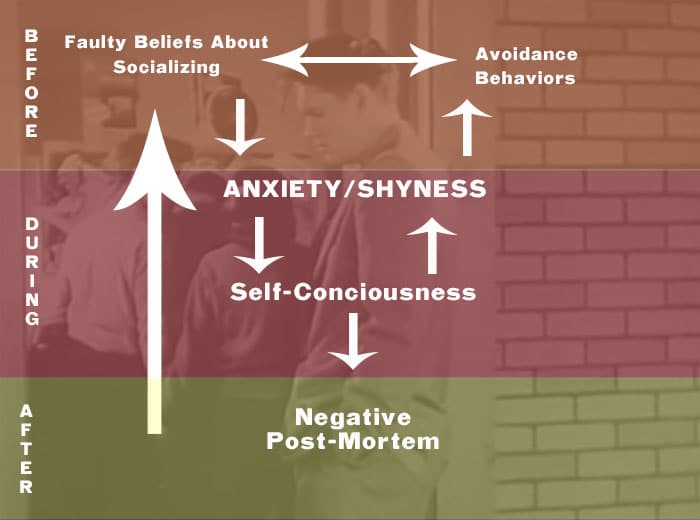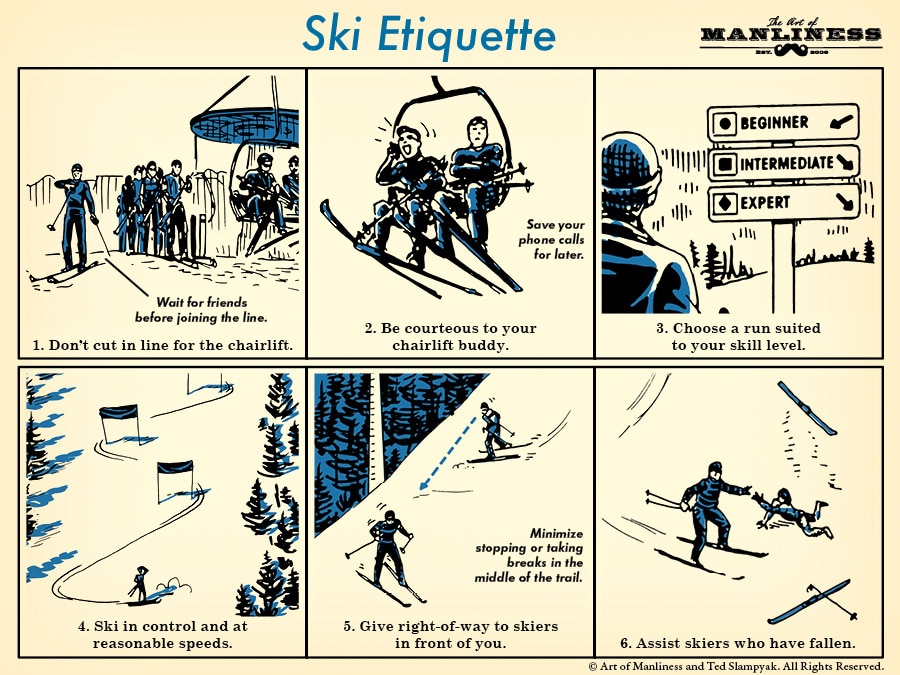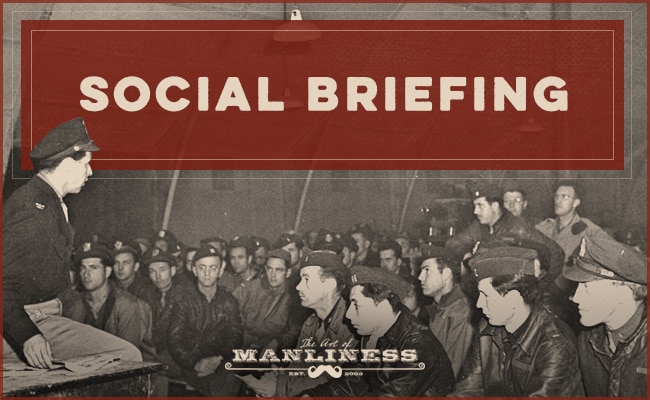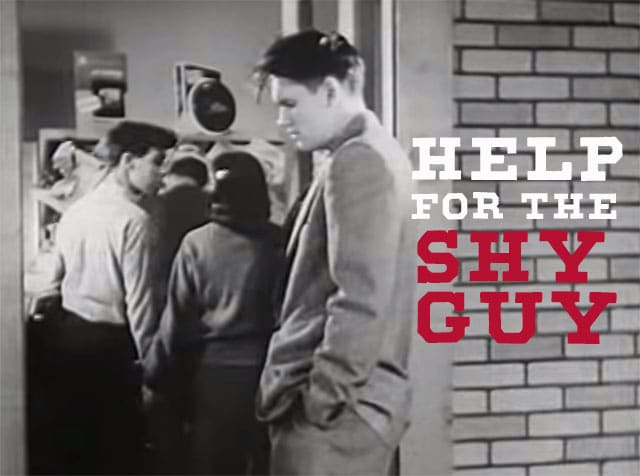
For the last couple of weeks we’ve been exploring the subject of shyness. In our first post, we talked about the nature of shyness and its symptoms. In last week’s article, we outlined the faulty thinking that leads to self-consciousness and anxiety, which in turn fuels shy feelings and the desire to avoid socializing.
Today we’re going to take the points we’ve made so far, and connect them with action steps grounded in cognitive behavioral therapy. Keep in mind that it took years for you to develop your faulty thinking about socializing, so it’s going to take awhile to transform that habitual, familiar mindset. Don’t expect overnight success. As you implement these tips into your life, slowly but surely you’ll find yourself becoming less and less shy.
Build the Foundation
Start with the easy stuff: hygiene and dressing well.
Self-consciousness drives shyness, and the easiest way to start mitigating that self-consciousness is by practicing good hygiene and dressing well – no cognitive re-framing required. Shy folks have enough to feel anxious about without worrying if people are looking at their acne or a stain on their shirt. It’s easy to dismiss such things as unimportant or superficial, but you’ll truly be surprised by how much more confident you’ll be when you feel like you look good. You’ll carry yourself differently in your interactions and be more inclined to strike up conversations with those you meet. Check out our extensive style section to start feeling more confident in how you dress.
Build authentic confidence through mastery.
Another indirect way to decrease your social anxiety is to build your confidence through your mastery of some subject or skill. Oftentimes shyness arises from a sense of not having anything of value to offer people. Being an expert in some area helps quiet this insecurity and makes you feel more sure of yourself.
Boost your resilience.
Shy people are unresilient in the face of a perceived social threat. Awkward social interactions can really shake them and torpedo their confidence.
Strengthening your overall resilience will give you the mental toolbox you need to bounce back more quickly from setbacks – whether social or otherwise. We wrote an in-depth series several years ago on becoming more resilient. If you’d like all the content in one place, check out our ebook version. You’ll find tactics on how to stop catastrophizing and avoid the “me/always/everything” mindset that reinforces the faulty idea that socializing is stressful and threatening.
Develop the Right Mindset
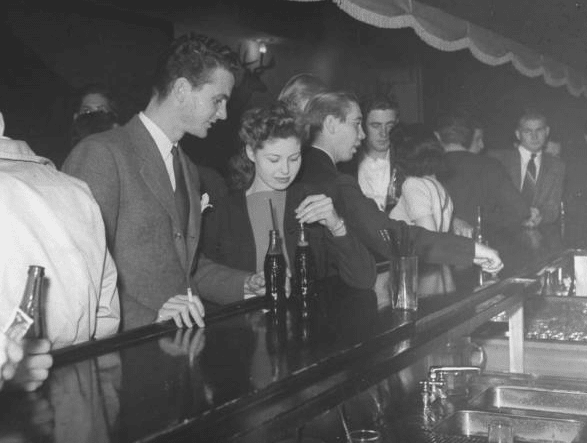
Understand that shyness is normal.
One of the things that makes overcoming shyness seem so hard is that shy people often assume it’s a problem that only a few others experience. This makes them apt to think that there’s something fundamentally wrong with them. The reality is that most people will experience shyness from time to time throughout their lives. Even many public figures are shy, but they’ve learned to manage it successfully. If they can do it, you can too. By understanding that shyness is common and more importantly, commonly overcome, the problem begins to seem far less debilitating.
Repeat after me: socially awkward moments aren’t survival threats.
Social anxiety has deep roots; in our primordial past, belonging to a group was essential to survival. Social anxiety is nature’s way of ensuring that we do what we have to do to stay with the pack. Even though today we live in a pretty safe environment and don’t have to worry about dying if we’re not part of a social group, our brains continue to gin up massive amounts of stress and anxiety at the specter of being rejected.
How do you overcome this primal instinct that’s out of sync with our modern environment?
A clue can be found in looking at another of our brain’s overly protective impulses. Researchers have found that when we exercise, our brain says we are exhausted even when our bodies actually have more to give; it does so because its primitive side is anxious about our survival and holding onto our physiological fuel. The pain from a hard workout isn’t “real” in the sense of it indicating that you can’t actually go on; you’ve simply triggered a primordial shut-off valve that can be pushed through. Studies have found that this survival tendency that holds us back from further exertion can be overcome by talking to ourselves as we exercise – constantly repeating mantras like “I’m feeling good.”
The same principle applies to addressing the problem of your brain overreacting to the threat of social rejection. The anxiety isn’t “real” in the sense that you’re actually in danger of something life-threatening befalling you. It’s a feeling being generated by a bunch of neurons. That is all.
If you make a bad first impression with a group of guys, what’s the worst that could happen? Sure, they might think you’re weird or some kind of flake, but so what? Are you going to die because of it? Unless you’re in a Mexican prison, probably not. If a woman rejects your date offer, what’s the worst that could happen? Are you doomed to be a genetic dead end? There are plenty of other women you can ask out and with whom you can possibly begin a happy and fulfilling relationship. You’re no worse off than you were before, other than what you allow yourself to feel about the encounter.
So if you feel stressed before, during, or after a social interaction, continually remind yourself that these awkward moments aren’t survival threats. When you start feeling those anxious, shy feelings, keep repeating to yourself: “Everything’s fine. My brain thinks it’s 10,000 BC and is overreacting. I’m not in danger of dying on the savanna. I’m not in danger of dying on the savanna.”
Decide that it’s okay if some people don’t like you (you don’t like some people, after all!).
Part of the anxiety and self-consciousness that arises from socializing springs from the fact that we want everyone to like us. If someone doesn’t seem to dig our vibe, it can be crushing, or at least irksome. “Why doesn’t he think I’m cool?!” You start to feel there’s something intrinsically wrong with you. But no one is universally liked; even very popular “nice guy” celebrities like Jimmy Fallon or Tom Hanks have their haters. And that’s okay! Everyone’s personality jibes with different people. Your personality just isn’t going to align with some folks. Remember, there are people you don’t like too! And you probably don’t generate terrible thoughts about them either, but simply think, “That’s just not my type of person.” So don’t take it personally if others don’t seem to get you.
Field-Test Your Skills
Start small.
A common approach shy individuals will take to overcome their anxiousness is take on some big social challenge like going to a single’s mixer or walking up to a model-esque woman and striking up a conversation. The problem with this approach is that if you fail to smoothly socialize, you just reinforce the narrative in your head that you’re shy and awkward, that you can’t change, that socializing is threatening, and that the only way to get rid of those threatening feelings is to avoid socializing altogether.
Success breeds success when overcoming shyness. The more you see yourself successfully managing your anxiety, the more your story about yourself will change. So put yourself in a position to have as much success as early as possible. Instead of setting big goals, set small ones that seem less threatening.
First, simply work on making more eye contact with people. When the cashier asks if you found everything you were looking for, look her in the eye when you say yes.
Then, work on asking a single question to people you engage with in passing interactions. When you get your daily coffee, ask your barista how her day is going. If you need help finding something at a store, ask a clerk to help you. After a college class, ask your professor to expand on something he touched on in the lecture.
Next, try to engage people with some back and forth questions and get a short conversation going.
Treat your small, everyday social interactions like little experiments. See what happens when you engage people socially instead of simply avoiding them. You may be surprised to learn that socializing isn’t that scary after all and won’t lead to existential annihilation.
Can’t even start small? Try a…cold shower?
What if you can’t even bring yourself to make eye contact with people? Well, you know it’s not a matter of physical capability – you can do it, you just can’t make yourself do it. Thus, the problem runs deeper than shyness. It’s an issue of courage – your will’s ability to overcome fear needs to be developed.
To strengthen one’s will, I would actually recommend starting with physical challenges rather than social ones. I believe that physical courage bolsters one’s emotional courage, more than the reverse. Our physical needs have always been the most fundamental to our survival; as such, they represent the seat of our strongest drives and our greatest fears. If you can tame your tendency to run from physical pain, you can then work your way up the hierarchy of needs and conquer your fear of emotional pain.
So if you have severe shyness, and can’t even begin to look people in the eye, my somewhat unorthodox advice would be to first make strenuous physical feats a regular part of your life. Do HIIT workouts at least a couple times a week. Take cold showers a few times a week. Take up long-distance running. Becoming comfortable will physical discomfort won’t automatically make you comfortable with socializing, but it will build your confidence and create a foundation for the belief that your will is capable of bossing your fearful mind.
But what if you can’t bring yourself to step into a cold shower either? There’s no easy answer. As Yoda wisely put it, “Do or do not. There is no try.” You have to reach a point where you simply take a big breath and jump in. Nearly every good thing in life, from our physical health to our social prowess, is predicated on the ability to put aside immediate fear and discomfort for a long-term reward. Strengthening your will is the prerequisite for all other progress.
Practice every day in non-threatening situations.
In our digital age, it’s easy to get out of practice with making small talk with strangers. We can do many of our transactions online, and stick to only talking with our familiar friends or our spouse.
But then, when we have to or want to socialize with new people, and we really want to make a good impression on someone special, we fail, and flagellate ourselves for screwing up what could have been something great.
This is definitely the wrong approach! Even if you’ve been mentally rehearsing how to act for weeks, if you haven’t been regularly practicing in the real world, it’s going to come out all rusty and creaky and awkward.
Social skills, like all skills, are highly perishable. You can’t expect to be smooth if you haven’t been exercising them on a daily basis. So don’t wait to try out your social skills until you’re in situations where the outcome is important to you. Instead, practice as much as possible where there aren’t any stakes at all – where you’re not going to see the person again and/or it doesn’t matter if you impress them or not. Keep practicing your patter with the guy who checks you in at the gym and the waiter at your favorite restaurant.
Then, when you do interact with someone that you hope to impress, the transition will be much smoother, and there will be a much greater chance of your succeeding!
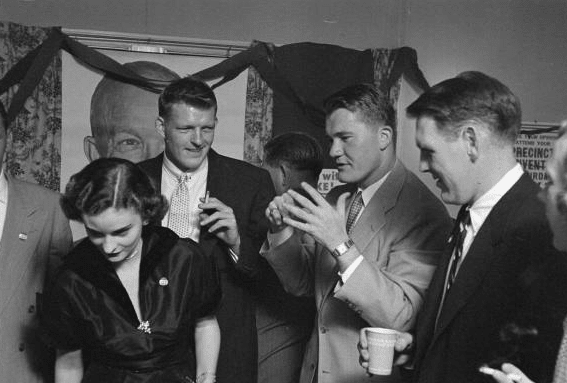
Get involved in activities that provide a predetermined social role.
One of the reasons folks get anxious about social encounters is that they’re unsure of what they’re supposed to say or how they’re supposed to act in certain situations. It’s the feeling of uncertainty that makes them the most anxious.
Shyness researchers have found that people forget themselves and their anxiety more easily if they’re involved in activities that are helpful to others and give them a pre-determined role or job. For example, many self-described shy people don’t have any problem talking to strangers if it’s part of their job.
If you’re looking to get over your social shyness so that you can make new friends, consider volunteering your services for organizations that align with your interests and values. Political man? Volunteer to work a table or booth for your respective party or interest group. Religious? Volunteer to bring and serve refreshments at the next singles event. Charity-minded? Ask to work the soup line or be a cashier at a big non-profit garage sale.
Quit thinking about yourself (because other people aren’t!).
As we’ve shown throughout this series, self-consciousness is the fuel that keeps shyness going and is the obstacle that gets in the way of successfully socializing.
If you’re looking for one tip that will help you feel less shy, this is it: quit thinking about yourself.
When you start feeling those symptoms of anxiety like clammy hands or butterflies in the stomach, don’t concentrate on them. Recognize those feelings for what they are (a reaction to a perceived threat), remind yourself there really isn’t a threat, and double down your focus on the person you’re with. Really listen to what they’re saying, ask follow up questions, and be genuinely curious about the person.
If you find yourself slipping back into self-conscious thoughts, remind yourself that no one is likely noticing how nervous you feel. Heck, other people probably aren’t thinking very much about you because they’re so wrapped up in their own thoughts or in what they’re about to say.
Again, people probably aren’t thinking about or judging you.
One thing that helps me stop thinking about myself whenever I have those occasional bouts of anxiety about socializing is finding ways I can serve the people I’m with at the moment. If you’re at a party and you start feeling a bit anxious and self-conscious, think of a way to compliment the other person, or how you can make them feel more at ease. Ask if they need a drink or something to eat. You’ll likely reduce their self-consciousness, while decreasing yours at the same time. It’s win-win.
You’d be surprised how many opportunities you’ll have during the day to perform such social graces. The more you seek to help others, the less you focus on yourself and your worries, and the less shy you’ll feel.
Be yourself, at least for now.
In general, I feel that the admonition to “be yourself” is truly terrible advice. That sounds stupidly contrarian, but here’s the question people never ask themselves: what is the “self”? If temperament and personality is 50% inherited, is your self your genetics? Is it the other 50% — the particular way you happened by chance to be raised? Is it an amalgamation of the millions of commercials you’ve seen on TV and online that has influenced your perspective in ways you’re not consciously aware of? And more importantly, what if your self would like to sit at home in a sweat suit 24/7, playing video games, and eating Twinkies? Should you still be “true to yourself”?
Rather than being yourself, I think you should decide who you want to be, find an ideal, and act in accordance with it. Take whatever you think is inherent to your personality and marshal it towards excellence.
The caveat to this is that when you’re first working on overcoming your shyness, it really is best to be yourself, and do whatever comes naturally (try to put on something other than a sweat suit, though). Someday you can work on making your voice more manly and attractive, conveying warmth, and projecting power, but for now just work on making eye contact and asking questions without mumbling. You’ve got enough to think about without trying to be charming while you’re doing it; overthinking things will just trip you up. As you get more comfortable, you can work on slowly integrating behaviors that convey winning charisma and make you come off as an even better version of “yourself.”
Fake it ‘til you make it.
Even if you act like yourself, it’s good to try to act like a non-nervous version of yourself. We’ve often espoused the principle of “acting to become,” and it’s highly relevant to overcoming shyness. By acting like you’re not shy, you’ll go a long way to actually getting rid of those shy feelings. This is an especially good tip for those who have less severe shyness or who used to not be shy, but have found themselves struggling with it for a period.
Implementation is simple: when you reach a point where you get tired of your shyness, say to yourself “F it! This is dumb! I’m just going to start acting confident.” And then you do so; act loose and relaxed, look people in the eye, and start talking to them. Works like a charm.
Review, Troubleshoot, and Improve
Challenge and avoid negative social post-mortems.
Negative post-mortems after social exchanges only reinforce your faulty beliefs about socializing. Next time you find yourself remunerating on all the ways you were socially awkward, challenge those negative thoughts.
For example, if you find yourself thinking, “Man, Grace must have thought I was boring. She left our conversation to go talk to some other people,” immediately ask yourself, “Did she leave because I was boring or could there have been another explanation for why she left?” Be honest with yourself if all the evidence is pointing a certain way, but leave room for alternative explanations when such evidence is lacking.
An even more effective way to squash negative post-mortems is to challenge your faulty thinking in writing:
Edit your negative beliefs, assumptions, and biases through journaling.
The anxiety that comes with shyness begins with the negative beliefs, assumptions, and biases you have about socializing. Thanks to this faulty thinking, you have a narrative in your head that you are and will always be a shy guy and that anytime you engage socially, you’re bound to mess things up and be awkward. You need to edit that story.
In his book Redirect, University of Virginia psychology professor Tim Wilson highlights research that shows how writing about an area of your life that’s troubling you can have a profound effect on changing your beliefs about it. Because writing is such a deliberate and rational exercise, it forces us to analyze our emotions with our more logical, hard-nosed pre-frontal cortex. Writing seems to make us more objective about our anxieties, and helps us put things in perspective.
You can use this writing effect to edit your negative shyness narrative by doing the following writing exercise in your journal:
Set aside 20 minutes and think about the last social encounter you had where you felt shy or anxious. Answer the following questions in as much detail as you can. Really let go and explore the thoughts and emotions you had:
- What went through your mind when you started to feel anxious? After the social encounter was all over? Did you make any assumptions that were wrong?
- What is it about the situation that matters to you?
- What was the worst thing that might have happened at the time? Did it actually happen?
- Why do you think you felt awkward or anxious during the social encounter? Do you have any evidence to support your sense that the interactions went terribly that isn’t just based on your feelings alone? What are some alternative explanations for why it was awkward?
- What negative biases might be affecting your thinking? Did you catastrophize? Were you doing some me/always/everything thinking? Do you have any evidence that those biases line up with reality?
- Did you engage in mindreading? What do you think people were thinking about you? Do you have concrete, objective evidence that people were really thinking those things about you or even thinking about you at all?
- Did you become self-conscious? What sort of things did you think about when you were feeling self-conscious?
- What could you do next time to manage the stress and anxiety of engaging socially? What are some examples of successful social engagements you’ve had? What can you learn from those successes to apply to the next time you start feeling anxious or awkward?
Do this exercise every other day or so. You’ll be surprised how much it can change how you feel about yourself and your shyness after just a few sessions.
Be patient and take it easy on yourself.
It is possible to change. You don’t have to let shyness get in the way of life. You can become what shyness expert Bernardo J. Carducci calls “successfully shy.” But change takes time. Don’t expect to be a fearless social butterfly in a matter of days or even weeks. It could very likely take months and even years to manage your shyness successfully. But little by little, you’ll gradually find yourself feeling less and less anxious or awkward about socializing.
Treat every social interaction like a learning experience. When it goes less smoothly than you wanted it to, don’t beat yourself up. Separate what was out of your control from what was, and dispassionately think about how you can improve the latter. Metaphorically and/or literally shrug, and then move on and try to do better next time.
Well there you go. How to quit being a shy guy. I hope you found this series helpful. I’d love to hear about your progress on overcoming your shyness. Drop us a line in the comments. And if you have any other tips that have helped you overcome your shyness, I’d love to read those as well.
Read the Entire Series
Part 1: Understand the Nature of Your Shyness
Part 2: Identify the Faulty Thinking That Leads to Your Social Awkwardness
__________________________________
Sources:
Overcoming Social Anxiety and Shyness by Gillian Butler
Shyness: Understanding, Hope, and Healing by Bernardo J. Carducci


